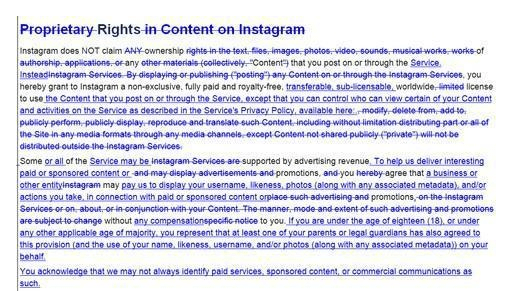Beloved phone camera app Instagram sure had a tumultuous week before Christmas, when a change in the wording of its terms of service caused the Internet to erupt in a chasm of knee jerk reactions: "Instagram is going to sell my photos!" the jerkiest knees exclaimed.
The clamor was so deafening that Instagram founder Kevin Systrom ended up retracting the TOS changes, pulling them back to the simpler language that existed before, to debatable user benefit. This backtracking however did not stop people from filing a class action lawsuit against Instagram for breach of contract, outcome TBD.
The wording that specifically raised users' ire was a couple of sentences that implied that Instagram can get paid for the usage of uploaded images in ads. Specifically:
"You agree that a business may pay Instagram to display your photos in connection with paid or sponsored content or promotions without any compensation to you."
This language has been replaced in the newer version with the older:
"You hereby agree that Instagram may place such advertising and promotions on the Service or on, about, or in conjunction with your Content. The manner, mode and extent of such advertising and promotions are subject to change without specific notice to you."
"The language we proposed also raised question about whether your photos can be part of an advertisement," Systrom wrote in his apology letter, explaining that what the company actually has planned for its eventual monetization is something along the lines of Facebook Sponsored Stories and Twitter's Promoted Accounts. Systrom also wrote that when the company comes up with that model it will then bring the specific plan to users.
"We do not have plans for anything like this and because of that we're going to remove the language that raised the question. Our main goal is to avoid things like advertising banners you see in other apps that would hurt the Instagram user experience. Instead, we want to create meaningful ways to help you discover new and interesting accounts and content while building a self-sustaining business at the same time."
Perhaps the dumbest thing about last week's backlash is, as The Verge's Nilay Patel expertly points out, Instagram has always had the ability to advertise against your photos on Instagram itself. So why include this language in the first place?
As Systrom also wrote, Instagram was created to become a self-sustaining business, wanting to leave its options open as it developed its business model in situ. New acquirer Facebook is also playing business model improv, and the once innocuous photo-sharing startup fell victim to one of its parent's clumsier moves. "Move fast and break things" sometimes breaks things.
From Patel's (who actually is a former copyright lawyer) read, Instagram's limited license means that it can't sell, i.e. give indefinite ownership of, your photos to advertisers, it can only display them in conjunction with promotional content on Instagram. The new Instagram TOS language also clearly precludes Instagram creating derivative works of your photos, which I am assuming a television commercial counts as.
But, as far as I can tell from reading the admittedly confusing TOS, the only way we're sure that Instagram won't eventually use user photos in ads without user permission is because of laws regarding publicity and because Systrom has said so. Peter Kafka agrees with me.
I also don't see where that right wouldn't extend to using those photos in a billboard or a TV commercial, though the TOS right now implies that the photos could be used in ads only on the Instagram platform. But I'm a user, not a lawyer.
During the TOS mess last week, the Taco Bell Doritos Locos commercial above was used by many as an example of what a hypothetical commercial with UCG Instagram photos would look like. This commercial is fascinating: While some of those pictures were brought in through social channels, with user permission through a Taco Bell promotion, the majority of those pics were actually manufactured by ad creative to look like Instagram photos. Side note: Does it get any more hipster than this?
"It's actually pretty sweet," Instagram user Jeremy Seltzer remarked after I posted the above video on Facebook. "It would be quite cool to have my Instagram shot in a commercial…" It's definitely possible some users would welcome the opportunity to showcase their work — the trick is finding out which ones.
Already startups like Pixlee are starting to crop up as tools to help brands manage the massive amounts of UGC image content, like the 49ers are doing with their gallery of fan photos here. Pixlee helps brands curate their fanpics by asking users to manually upload relevant photos. It also asks for specific permission to use individual photos in promotion pre-upload.
So where does the line get drawn between this and yours or Tiffani Amber Thiessen's Starbucks Instagrams eventually making it to national television? I, and a lot of other people, don't know for sure, but it's probably through an opt-in user submission process, like in Taco Bell or Pixlee's case.
Instagram, which gave Taco Bell permission to use its trademark and branding, did not receive any money for its involvement in the Doritos Tacos Locos spot and neither did anyone who actually submitted photos. They did it out of their own desire for 15 minutes of Taco fame.
Tracked TOS changes via Quora and William Carlton

No hay comentarios:
Publicar un comentario